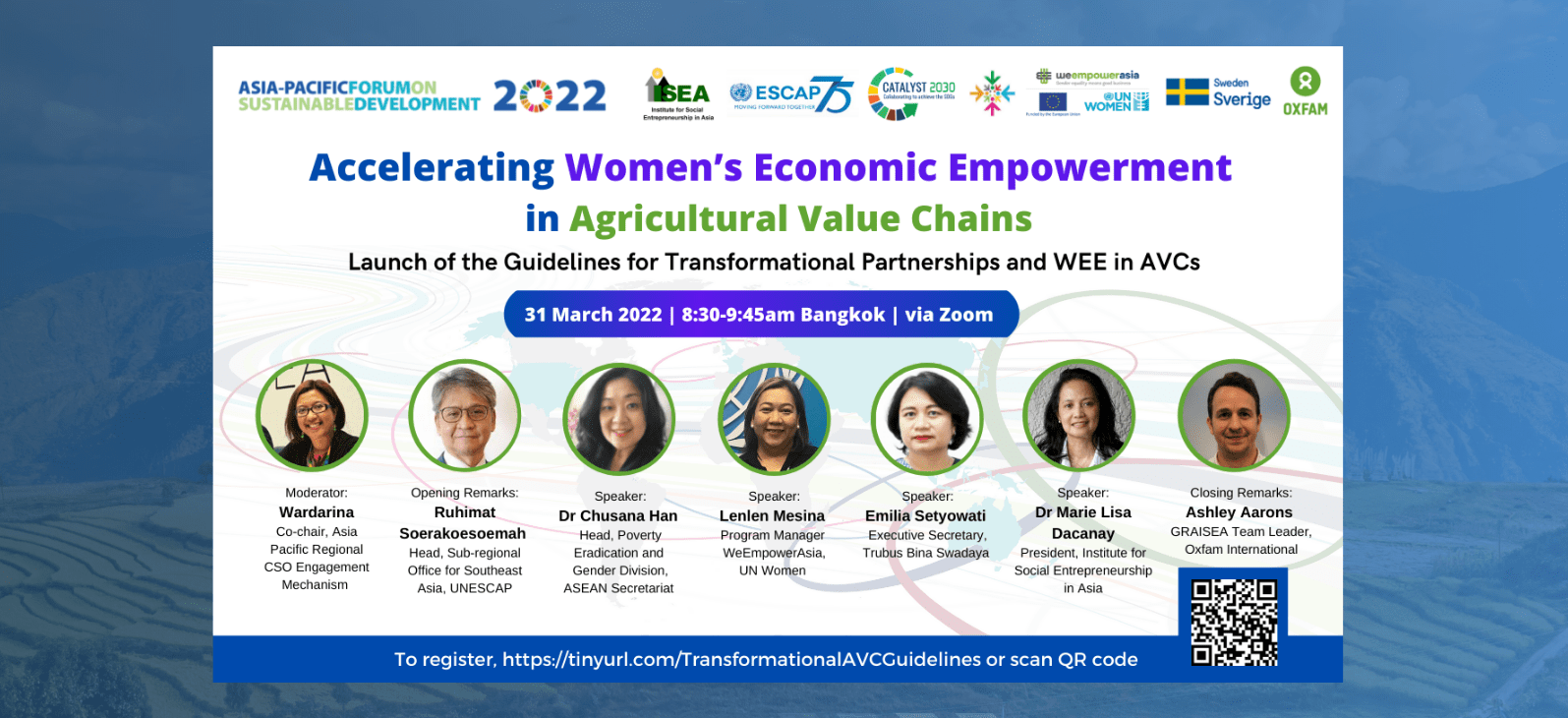
The relevance and importance of agriculture as a sector in the ASEAN and its member states were underlined when the COVID-19 pandemic threatened food security and livelihoods. Women play an important role in agriculture and agricultural value chains (AVC) in the ASEAN, with 48–75% of employed women working in the sector in Cambodia, Myanmar, Lao PDR, and Vietnam. Data shows that one-third of ASEAN workers in agriculture are women, although this figure is probably higher as women are usually part of unpaid family labor. At the same time, 58% of women in the ASEAN are paid less than their male counterparts. When women are engaged, their participation is often limited or constrained by unpaid care and domestic work responsibilities and other barriers such as limited access to resources, services, and under-representation in producers’ groups. In terms of land ownership, only 13% of agricultural land title holders in the ASEAN are women.
Even as women and men small-scale producers are the pillars of the agriculture sector, poverty has remained significantly higher among them and is expected to increase with the overall impact of COVID-19 on the region’s economy. Although ASEAN member states have started promoting inclusive agribusinesses, studies characterized these efforts as disjointed and not directed at key constraints that impact women and men small-scale producers.
In 2015, the Institute for Social Entrepreneurship in Asia (ISEA) came up with a research that identified eight best practices among social enterprises and inclusive business models in AVCs in Indonesia, the Philippines, Thailand, and Vietnam. These models were considered as best practices because of their significant impact in improving the lives, livelihoods, and position of small-scale producers in their respective supply chains. The factors of success from these best practices were synthesized into a set of Benchmarks for Transformational Partnerships and Women’s Economic Empowerment in AVCs (Benchmarks). These serve as an aspirational standard for small and medium enterprises (SMEs), corporate agribusinesses, and AVC program holders and supporters to positively impact on marginal and small-scale producers, especially women, as well as contribute to the realization of the SDGs.
To elevate the Benchmarks to the level of policy in the ASEAN Economic Community (AEC), the Guidelines for Transformational Partnerships and Women’s Economic Empowerment in Agricultural Value Chains (Transformational AVC Guidelines or Guidelines) was developed. The Guidelines are a set of policies and incentives being proposed to supplement existing ASEAN policies to become more responsive to the needs of women and men small-scale producers in AVCs. It has the following critical elements:
- Enabling innovations that support AVC development for food secure, resilient and empowered small-scale producer communities
- Enabling women's economic empowerment that spans all functions and organizations engaged in AVC development, management and governance
- Mobilization of investments on sustainable consumption and production systems that enable women and men small-scale producers as stakeholders in achieving a climate-resilient and green economy
- Recognition and support for social enterprises and inclusive businesses as innovators and key enablers of women and men small-scale producers in AVCs
- Mobilization of support for social innovation platforms that mainstream sustainable agriculture, transformational partnerships, and women's economic empowerment in AVCs toward measurable social impact and accelerating the achievement of the SDGs.
The Transformational AVC Guidelines promote food security, social protection, and resiliency that are critical to the effective recovery of women and men small-scale producers from COVID-19 and similar disasters or crises. These provide policy support to women in agriculture and the informal sector as subjects for empowerment beyond women in the formal economy and entrepreneurs that current policies on women’s empowerment in ASEAN focus on. The Transformational AVC Guidelines also promote inclusive economic growth that reduces poverty in the food, agriculture and forestry sector. Moreover, the Guidelines recognize and support critical stakeholders such as social enterprises and inclusive businesses in the process fostering mutually beneficial partnerships to transform the lives and livelihoods of small-scale producers.
The Transformational AVC Guidelines is a policy paper outlining concrete and measurable actions and policy recommendations that ASEAN and member states may consider. By adopting the Transformational AVC Guidelines, ASEAN and its member states would pave the way toward empowering women and men small-scale producers in AVCs as stakeholders in a poverty reduction and inclusive growth agenda that would accelerate the achievement of the SDGs.
To formally present the Transformational AVC Guidelines, ISEA and partners are organizing a virtual launch on March 31, 2022 from 08:30-9:45AM (GMT+7). The virtual launch is dubbed as ACCELERATING WOMEN’S ECONOMIC EMPOWERMENT IN AGRICULTURAL VALUE CHAINS: Launch of the Guidelines for Transformational Partnerships and WEE in Agricultural Value Chains.
ACTIVITY OBJECTIVES
The virtual launch has the following objectives:
- Formally launch and present the proposed Guidelines on Transformational Partnerships and Women’s Economic Empowerment to key stakeholders of ASEAN and its member states
- Generate support and affirmation from key stakeholders to commit to the recommendations outlined in the proposed Transformational AVC Guidelines
- Facilitate relevant inputs and perspectives to further strengthen the Transformational AVC Guidelines based on current initiatives of AVC program holders including governments
- Explore the potential application of the Transformational AVC Guidelines in other sub-regions in Asia Pacific
- Build champions from the public and private sectors in ASEAN on the Transformational AVC Guidelines.
TARGET PARTICIPANTS
Participants will include government representatives, private sector representatives, civil society concerned with women and agriculture and other institutions promoting women empowerment. This launch will also gather various interest groups and constituencies interested in the practice and promotion of transformational partnerships and women’s economic empowerment in agriculture and agricultural value chains.

